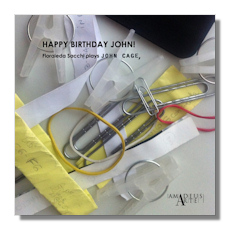
The Internet's Premier Classical Music Source
Related Links
- Cage Reviews
- Latest Reviews
- More Reviews
-
By Composer
-
Collections
DVD & Blu-ray
Books
Concert Reviews
Articles/Interviews
Software
Audio
Search Amazon
Recommended Links
Site News
 CD Review
CD Review
John Cage

Happy Birthday John!
- Beauty
- Primitive for Prepared Harp
- In a landscape for Harp
- A room for Prepared Harp
- Just Sounds
- variations 1-5
- Composing
- Waiting for Harp
- Questions
- 4'33" for any Instrument
- Hope
- Dream for Harp
- Suite for Toy Harp
- No. 1
- No. 2 Same Speed
- No. 3 Slower
- No. 4 Same tempo as #3
- Quiet the Mind
- Prelude for Meditation for Prepared Harp
- Death & Life
- Postcard from Heaven for Harp, eBow, Voice
- The music I do not Know
Floraleda Sacchi, harp
John Cage, speaker
Amadeus Arte AAP12001 59:19
Cage approved of change, of course. And of the experimental. Number 6 in Amadeus Arte's "Portraits' Collection", this completely successful CD, Happy Birthday John!, also falls into the category of "tributes" to Cage on the twin anniversaries of 100 years since his birth and 20 since his death. It takes the format of Cage's music interspersed with spoken commentary on it, on (his) life, and on music in general by Cage himself. Such a formula on CD could easily have fallen flat, come across as self-conscious and/or choppy, intrusive and counter-productive to a greater understanding and enjoyment of Cage's world.
Here it certainly does not. True, this is a sequence of music (a couple of dozen piece arranged or written for harp) and words which needs – or at least invites – a different kind of engagement by the listener. Perhaps a more active one. Track 12, for instance, is four minutes predominantly of silence… Waiting, for harp. The harp that "arrives" is presumably thus intended to be set in much greater relief than if it were there as part of an unbroken sequence in the way we usually experience a CD.
For sure, we could use the Pause button to replicate the precision and insight which result from such selection. But how many of us regularly would do so? The CD has been conceived without making a fuss about the imposition of these "extras" on his music; Cage would hate such an idea. And that works very well. This is in no small part explained by one of Cage's aphorisms used as a spoken intercession– "I love sounds just as they are. I do not need… them to be more than what they are."
So here is a CD which explains, respects, honors and celebrates this profundity. Here is a sequence of sounds to be taken purely at face value. They're John Cage's sounds. To approach them in the spirit of another of his maxims, "The material of music is sound and silence. Integrating these is composing", is to have a much greater and much more satisfactory appreciation of the essence of Cage.
As a result of adopting this attitude it's hard not to respond to the gentleness of the instrument used on the CD, the harp of Floraleda Sacchi. It's an embodiment of the humility, assuredness and perception of Cage's own musicology. Each of the works here is meticulously performed; performed with superb expression and involvement. Each does the essence of that musicology of Cage's proud. Sacchi balances the inner confidence and light with the purely acoustic essence which was so important to Cage. Caution is never brought out when reserve and reflection are more appropriate. Nor thrust when is projection. Her playing, in other words, combines sensitivity with perception – and with great technical acumen. There is definition without domination.
Floraleda Sacchi was born in 1978 in Como in northern Italy. Having studied in Italy, Canada and the United States, her career has encompassed multiple and widespread achievements. Her own musicological and literary output is significant. Her performances, the number of works composed for her, and her prizes, are impressive. In many ways her experience and perceptiveness make her an ideal communicator for Cage.
Even if you don't begin your listening with the justly celebrated, In a Landscape, you'll be struck by the varied and unstoppable beauty of Cage's music when heard on the harp. Some of the works on the CD were specifically composed or "prepared" originally for harp. Others may have been specially arranged for the present enterprise… the slim booklet that comes with the CD isn't always clear.
The acoustic is close, pleasing and has just the right amount of emphasis on the harp's sounds – as sounds. Never as a faddish phenomenon. The booklet, as has been said, could have benefitted from more explanation, a little more context. This is splendid and important music, though, played in a winning and appealing way. Whatever your (previous) experience of Cage and his world and approach to music, its performance and reception, this is a CD to look closely at. It's unlikely that you won't be inspired by much of what it contains. At the very least, the delicate command which Sacchi has of the entirety of Cage's work – albeit concentrating happily on this particular corner – must inspire you to look further. Recommended.
Copyright © 2012, Mark Sealey



















